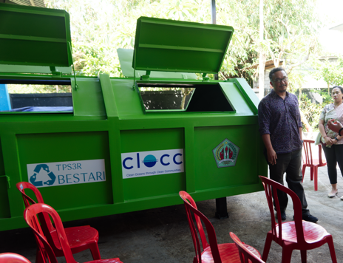On December 3rd, 2024, a ceremony was held in Tabanan, Bali, Indonesia, to mark the handover of a Waste Masterplan. Developed by collaboration the CLOCC team and Tabanan stakeholder, the plan outlines a pathway to Integrated Sustainable Waste Management (ISWM) for a region with a population of half a million residents.

This Waste Masterplan is the result of years of collaborative efforts utilizing the CLOCC methodology and the seven steps of ISWM. This inclusive process involved stakeholder (Tabanan agencies, private sector, NGO, villages government) workshops that brought together a broad range of participants to develop a sustainable plan at both regency and village levels.
When the process began in 2022, initial data collection and research revealed that Tabanan Regency was generating 442 tons of waste daily, with almost half (48%) improperly managed and leaking into the environment and being openly dumped. The study also highlighted that Tabanan had the capacity to recover only 24% of waste, emphasising the need for significant changes in waste collection and processing systems.
While developing the Waste Masterplan, the CLOCC team and its partners—the Indonesian Solid Waste Association focus on regency level. Other partner - GoSirk Indonesia—worked to optimize current operations and build capacity in three Tabanan villages as a pilot project: Bengkel, Dauh Peken, and Wongaya Gede. These efforts focused on education, behavioral change, and regular evaluation. Villagers were empowered to act as local champions, driving community capacity-building in waste management. By fostering local ownership, the team has been building a strong long-term commitment to the waste management system from all stakeholders.

In addition, the CLOCC team provided technical support to village governments to optimize their TPS3Rs (village-level recovery facilities) and working supporting improvements to the governance aspects like regulation and village budgets to ensure the waste management system's long-term viability. Initially, many local recovery facilities were non-functional, and villages lacked the knowledge and resources to operate them effectively.
Testimonials
Dauh Peken Village – Andrie
"Four years ago, before CLOCC began in Tabanan, our village had a TPS3R, but it was not operational. We had minimal equipment and didn’t know how to use it. In 2022, we received three different waste bins, but there was almost no separation at source. At that time, the TPS3R served only 15 customers. Today, it serves 600 households. This transformation would not have been possible without the CLOCC program. With their support, we encouraged households to separate waste at the source by providing educational materials. We also developed regulations, introduced waste fees, and streamlined operational processes. Change doesn’t happen quickly in communities, but with a step-by-step approach, it is achievable.”
Bengkel Village – Wahya Biantara, Village Leader
“We have been part of the CLOCC capacity-building program since its inception. I was inspired by the waste management training and wanted to implement these lessons in my village, Bengkel. Initially, I thought waste management was simple, but I quickly realized its complexity, especially the social and cultural aspects. In 2020, only 20% of households subscribed to the waste service and paid the fee. Today, that number has risen to 50%. I am confident we can reach 100% within three years.”
These testimonials highlight the profound impact of education, awareness, and stakeholder collaboration. They demonstrate how significant improvements in community waste management can be achieved by fostering understanding and engagement.
The Waste Masterplan handed over on December 3rd, 2024, aims to scale up these efforts, bringing regency-wide change to Tabanan’s waste management system. The document provides a framework for developing an inclusive, economically viable waste management system in Tabanan Regency. It emphasizes effective policy-making, inclusivity, understanding the entire waste and recycling value chain (including the informal sector), and balancing centralization with local ownership.
The CLOCC team will continue to oversee the implementation of the Waste Masterplan to ensure that long-term goals are achieved. The ambition is to transform waste services for Tabanan’s 500,000 residents, aiming for 100% waste collection by 2045, a processing and recycling rate of 36% by 2045, and the creation of thousands of local jobs.

.png)











Comments